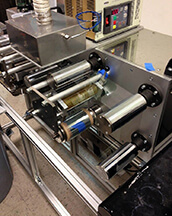Purdue's Birck Center to lead workshop on SMART film printing and nano-manufacturing applications
May 21, 2015
 |
|
This is a photo of the microgravure/slot die coating machine in Discovery Park's Birck Nanotechnology Center. It will be used in conjunction with other printing tools such as roll-to-roll inkjet-laser processing and roll-to-roll plasma chemical vapor deposition, to create SMART films. (Purdue University photo/provided) |
WEST LAFAYETTE, Ind. – Researchers at Purdue's Birck Nanotechnology Center will lead a daylong workshop next month in Discovery Park to begin an initiative for developing and advancing economically viable nanotechnology manufacturing techniques to enable sensors and devices for a broad range of applications.
The Workshop on Printing and Scalable Manufacturing of Aware and Responsive Thin Films, or Printing SMART Films, for Bio/Pharmaceutical, Agriculture/Food, and Health applications is at 8:30 a.m. to 4 p.m. June 5 in the Burton D. Morgan Center for Entrepreneurship, Room 121.
The goal is to link small, medium and large enterprises in diverse sectors with original equipment manufacturers and university researchers, said Ali Shakouri, the Robert L. Kirk Director of the Birck Nanotechnology Center and Professor of Electrical and Computer Engineering.To register for the event, go to: https://purdue.qualtrics.com/jfe/ form/SV_9XBaiXJThPkvV7n"The largest hurdle currently facing wide-scale implementation of smart functions into consumer products is cost," Shakouri said. "Scale-up production and integration in diverse manufacturing platforms are key challenges."
Shakouri said the workshop will serve as a starting point for a long-term consortium to improve SMART film manufacturing techniques, including custom-designed roll-to-roll systems and functional printing. The Purdue project, which is housed in Birck, will utilize a new laboratory for roll-to-roll manufacturing completed in early 2015.
 |
|
Ali Shakouri |
The workshop will provide an overview of Purdue's Printing SMART Film initiative, as well as a panel discussion with industry leaders and an update on the latest research in the field. Students will present their work through a research poster session and by live demonstrations.
Initiated by Shakouri, the research consortium will focus on developing more economical printing and manufacturing methods for SMART films. SMART films are aware and responsive thin films that can record data and provide real-time feedback.
Shakouri said initial efforts for SMART films' applications are in health science, pharmacy, food packaging and agriculture.
Twenty-four faculty members across 10 Purdue schools are working with Shakouri on the university's consortium.
The applications of SMART films could be revolutionary. Advanced nanotechnology films on food packaging could track food contamination, bacterial growth, and provide detailed information on a product's shelf life, both providing the consumer with information and allowing manufacturers to track a product throughout the supply chain.
Other applications include bandages that track physiological information and SMART pills that release medicine in response to changes within the body.
Through several grants of more than $3 million from the National Science Foundation, Purdue researchers are focused on the goal of creating a nano-manufacturing method that is "scalable," or capable of mass production at low cost.
Writers: Phillip Fiorini, 765-496-3133, pfiorini@purdue.edu
Jamison Stoike, 765-494-4719, jstoike@purdue.edu
Source: Ali Shakouri, 765-496-6105, shakouri@purdue.edu

